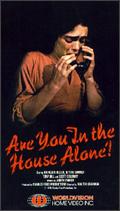
ARE YOU IN THE HOUSE ALONE?
US, 1978, 96 minutes, Colour.
Kathleen Beller, Blythe Danner, Tony Bill, Dennis Quaid.
Directed by Walter Grauman.
Are You Alone In The House? seems, at first glance, to be one of those thrillers where the heroine is terrorised by an unknown observer. However, it focuses on an adolescent girl, family relationships, the experience of rape and her having to cope with it.
The film has a very strong can and is well served by it - making the plot and its rather melodramatic treatment more plausible. It is in the vein of such films as Cry Rape, Lipstick. Direction is by Walter Grauman, director of many telemovies and such melodramas as Rage to Live, Lady in a Cage.
1. The impact of this melodrama? Telemovie? Thriller? action? Social observation?
2. The telemovie style for home audiences? Treatment of a lurid theme? Portrayal of characters, situations? The dramatising - and the moralising? Impact for parent audiences, adolescent audiences? For adolescent girls and their sharing the experience of Gail?
3. The Californian atmosphere: the town, family, outings, school and classes? The situation of the 1970s, frankness in discussions, sexual relationships? The background of feminist questions? Unemployment issues?
4. The style of the thriller, the opening and the attack on Gail, her being taken to hospital. questions, the flashbacks? The ominous title and the reference to the notes? The subjective camera indicating someone spying on Gail? Her growing fear, the invasion of her privacy, the phone calls? The attack by Phil? How well did the film work as a menace thriller?
5. The portrait of Gail, a credible adolescent girl, her relationship with her family, love for them, her mother's stern discipline, her father's care? Her hearing them quarrel? Her accusing them of not listening? Of over-protecting her? of not telling her about her father's job? Her relationship with her friends at school? The preparations for the first date? Her friendship with Steve? Her discussions with her school friend? The first note and the phone call after the outing? The further notes and her reaction, wanting to talk with her mother, with the school counsellor? The offer by the Literature teacher? Her going about her ordinary work at home, in photography, the photography classes? The babysitting - and the phone calls? The growing relationship with Steve, the sexual encounter - and her being spied on? The repercussions of her not being a virgin for and court proceedings about the rape? The clashes with Steve? Her moodiness? Going to see her father at work and seeing him at the bar? Her trying to discuss things with her mother? The build-up to the visit, the rape experience? Hospitalisation, not wanting to tell who did it? her being persuaded? The visit of the teacher and it impact on her to go back to school rather than escape the situation, her friend dropping her? Steve and his concern? Realisation that Phil was free, would menace another girl, the beginning of the notes, setting up the camera, catching him, his violent outburst at her? tier final comments about the trial, his going to another school? The credibility of the situation, the vulnerability of the adolescent girl, her own responsibility, having to cope with rape?
6. The portrait of her parents: their seeming to be severe in discipline and protective? Her mother's criticism of the late, return home after the date? Gail's protest? her mother's concern about Gail's experience? Her memory of marrying at 18? The relationship between Ann and Neil? Easy, quarrels, tensions? Neil's being sacked? Not telling Gail? Going out to work regularly but sitting in the bar? Their reaction to the rape situation? Support of Gail? Neil's thought of violence? Their going to court? Their support of their daughter?
7. The portrait of the boys - and the device of mystery as to who Gail's assailant was? Steve and the date, Ann's suspicion, the friendship between Gail and Steve, at school, meals together, outings, the sexual relationship? Tension, Steve and Gail's fears? The reconciliation, his going to see her while babysitting - too late? His support after the experience, helping her with the photos? The boy with whom she had clashed, audience suspicion of him, his taunts? The comparisons with Phil - the background, his girlfriend, seemingly happy, the parties? His arrival, revealing that he was the caller and note writer, the viciousness of the rape? The aftermath, his going to class, his smiling, thinking he had escaped? His starting again, his being caught, the violence against Gail? Enough action taken against him? His getting off? Gail's not being able to be convincing in court against him because she was not a virgin? The film's comment about rape and characters like Phil?
8. People at the school - the drama and photography teacher and his support of Gail, her own photography, Posing (sexy)? Developing the films? Using her photography to trap Phil? The Literature teacher and her reading of Byron? Her sympathy towards Gail, her comment on the behaviour of the students, her visit to Gail's home and encouraging her to return to school? The school counsellor and her ultimate ineffectualness?
9. The credibility of the characters and the plot? Mystery aspects? Social drama and social criticism?